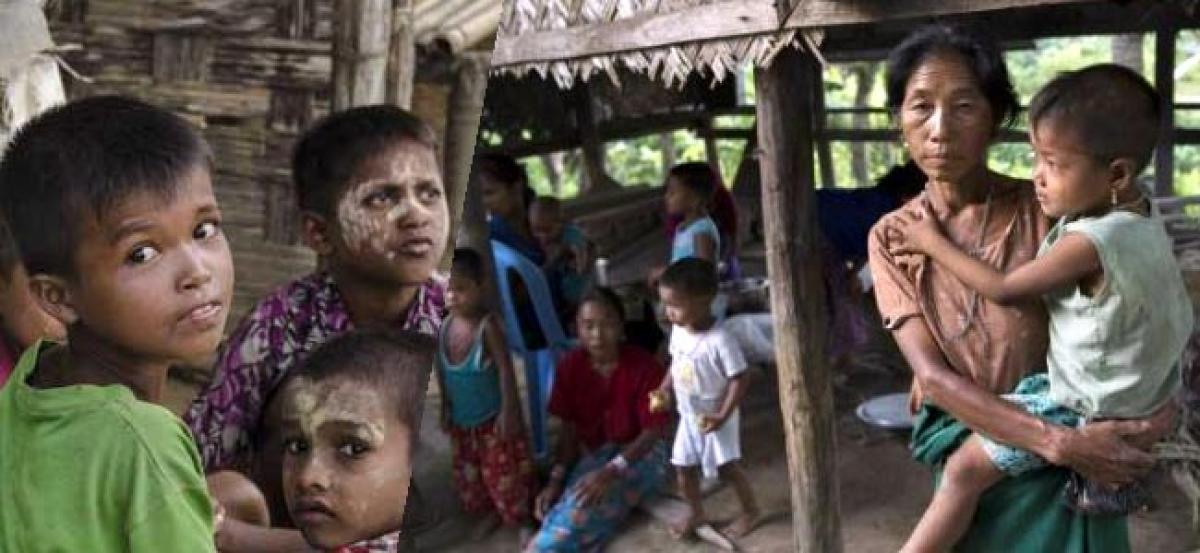Live
- AP Assembly to Discuss Grants and Elect Railway Committee Rep
- Former Brane employees pour out woes to minister
- Will not allow demolition of houses of the poor: Kishan
- Telangana SEEEPC survey underway; over halfway mark achieved
- Indira Shakthi Bhavans to dot 22 districts in TG
- KTR: BJP shielding Revanth to divert Lagacharla trouble
- Dance festival leaves audience spell-bound
- Garikapati visits Durga Temple
- BJP, BRS hand in glove to stymie Musi project: Congress
- Govt sanctions houses to displaced families of Midmanair
Just In

Food aid for more than 80,000 people in parts of northwest Myanmar has been suspended because of a military clampdown in the area, the World Food Programme said on Wednesday.
Yangon: Food aid for more than 80,000 people in parts of northwest Myanmar has been suspended because of a military clampdown in the area, the World Food Programme said on Wednesday.
Troops have poured into the north of Rakhine state near the Bangladesh border since attacks on police posts over a week ago, closing off an area where most people are from Myanmar's persecuted Muslim Rohingya minority.
Security forces have killed at least 30 people since the raids, according to state media, while a tally of latest official figures show at least 40 people are being held.
Eleven were arrested in the past two days and are now being interrogated, according to a government statement late Wednesday.
The WFP normally feeds some 80,000-85,000 people in the locked-down area, but aid deliveries have been disrupted and the military has prevented any supplies getting through.
"There is military everywhere and a curfew in place, and so it's impossible to access any of the areas affected," said Arsen Sahakyan, WFP's partnership officer in Myanmar.
"The areas affected are also the areas where we normally operate."
Activists say a violent crackdown has been unfolding, with troops gunning down Muslim civilians and torching their villages. But the military says it has itself been fending off violent attacks.
The government has blamed the border guard attacks on Islamists from a little-known group called "Aqa Mul Mujahidin" and said hundreds of militants are planing more attacks.
Details of the killings and the ensuing lockdown by the military have proved difficult to confirm in the remote and tightly controlled area.
The violence has raised the spectre of a repeat of sectarian unrest in 2012 that ripped the impoverished state apart, leaving more than 100 dead and driving tens of thousands of Rohingya into squalid displacement camps.
Severe restrictions
The Rohingya are reviled as alleged illegal immigrants by many in Myanmar, where they face severe restrictions on their movements, education and access to food.
Fears the violence will spread to other parts of the state have prompted the WFP to restart aid to some 6,000 displaced people whom they had stopped feeding several months ago.
Tensions have simmered between the Buddhist Rakhine community and the Muslim Rohingyas since 2012. The unrest left the state largely divided along ethnic lines.
Many Rakhines -- who are also an impoverished and sidelined community in majority-Bamar Myanmar -- deeply resent the international aid given to the Rohingya.
In 2014 most aid agencies pulled out of the state after mobs of Buddhist extremists ransacked their offices and warehouses, accusing them of bias in favour of Muslims.
That anger was on display outside a monastery in Maungdaw that has become a makeshift refugee camp for Rakhines, where a sign read: "We don't need any support from UN, INGOs -- Maungdaw Rakhine state."
"I'm really angry now," said Hla Shwe, a Rakhine villager who was staying inside.
"When our Rakhine houses were burned and attacked in 2012, they didn't let the world know," he said, referring to the aid agencies.
"We are the ones who have became local IDPs (internally displaced people). We are the ones who don't have citizens' rights.
"They should think about the human rights of Rakhine ethnics as well.”

© 2024 Hyderabad Media House Limited/The Hans India. All rights reserved. Powered by hocalwire.com







